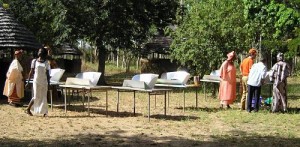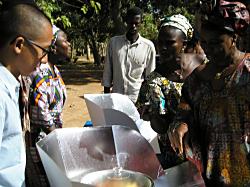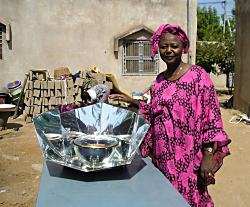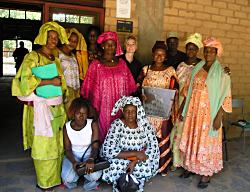
Solar Cooking Training in Mali
In November 2004, I traveled to Mali for three weeks to hold a solar cooking training and to continue negotiations with our business partner in Mali for their first shipment of HotPots.
Solar Household Energy, Inc sponsored the training, which was held at the Peace Corps Mali training facility, 15km outside of the capital city. Among the 53 participants were Peace Corps staff, volunteers and counterparts from Mali, Burkina Faso, Niger and Guinea. For the Malian government, representatives from the Ministry of Energy, the National Solar Energy Research Center, the Ministry of Industry and Commerce and the Agency for the Promotion of Women were present. Also in attendance were representatives from NGOs with focus on women’s issues, energy or the environment. This training not only provided solar cooking training, but also an introduction of the HotPot to people who may be involved in its distribution in West Africa. Peace Corps is interested in supporting the expansion of solar cooking technology in the region, by training its volunteers to transfer the technology to their host communities.

Our Malian business partner, SYST-COM & Energie, played a crucial role in organizing the logistics and providing some of the training material. I chose Mr. Gnibouwa Diassana, an inventor and pioneer of solar cooking in Mali, to be the head trainer. Our assistant trainer was Mme Camara Anna Dembele, a member of AFIMA (the Association of Women Engineers in Mali). As member and trainer for AFIMA, she teaches groups of women to construct and use the CooKit, a cardboard panel solar cooker. She also has experience using the HotPot.
 We had 9 HotPots plus one solar box oven to cook with during the training. The first day we provided some background data on environmental degradation in West Africa and discussed the need for solar cooking. This is something that all participants could relate to. The majority of West Africans rely on agricultural production as their primary source of income and sustenance. They also depend primarily on wood for cooking meals. The decline of agricultural production and the increasing scarcity and cost of cooking fuel threaten the lives of millions in West Africa.
We had 9 HotPots plus one solar box oven to cook with during the training. The first day we provided some background data on environmental degradation in West Africa and discussed the need for solar cooking. This is something that all participants could relate to. The majority of West Africans rely on agricultural production as their primary source of income and sustenance. They also depend primarily on wood for cooking meals. The decline of agricultural production and the increasing scarcity and cost of cooking fuel threaten the lives of millions in West Africa.
The second day of training was devoted to hands-on solar cooking by all participants. Each of the six groups was assigned to cook one of the traditional West African dishes: rice, peanut sauce, tomato sauce, okra sauce, leaf sauce, meat yassa, beans and fish. We also demonstrated tomato conservation using the box oven. Conditions for solar cooking were pretty good even though it was the cold season for Mali, which can bring cloud cover in the morning. For us, scattered clouds gave way to full sun by mid-morning.
The men were eager to help and rolled up their sleeves, much to the enjoyment and subtle amazement of the women participants. In Mali, as is true for many developing countries, gender roles are rigidly defined. Cooking and food preparation are strictly women’s roles. It was a pleasant surprise to see the enthusiastic participation of the men in each group. They, too, have a vested interest in learning how better to provide for their families. Every family in Mali carries the burden of costly cooking fuel.
 In the latter part of day two, participants had the opportunity to try the food they had prepared that morning. They were pleasantly surprised to find that the food was cooked well and tasted great. People actually started complaining that they were eating too much, that they were too full and couldn’t possibly eat anymore. In a cultural context, this is a great compliment. It speaks of the quality, good taste and correct preparation of food. This was affirmed by their next question, which was, “what are we doing tomorrow, are we going to prepare more food?”
In the latter part of day two, participants had the opportunity to try the food they had prepared that morning. They were pleasantly surprised to find that the food was cooked well and tasted great. People actually started complaining that they were eating too much, that they were too full and couldn’t possibly eat anymore. In a cultural context, this is a great compliment. It speaks of the quality, good taste and correct preparation of food. This was affirmed by their next question, which was, “what are we doing tomorrow, are we going to prepare more food?”
Many participants of this training are likely HotPot distributor candidates for their own communities; they are representatives of women’s associations, artisans or local government. SYST-COM would be the coordinator of these contacts in each region and would provide needed support and HotPot stock. SHE, Inc and SYST-COM have a contractual agreement that names SYST-COM the HotPot distributor for Mali, Guinea, Niger, Burkina Faso and Mauritania.
We spent the third day learning how to turn solar cooking into a business activity. A session on marketing was given by Peace Corps consultant, Mamadou Diallo. He discussed marketing concepts and different tools that could be used to best exploit this new technology to urban, peri-urban and rural communities. Participants chimed in with advice on what works best in their communities: demonstrations, debates, community meetings, or for the urban centers – billboards and posters. Demonstrations would be the most convincing tool for any community. To get things started, HotPots were given to representatives from each country and to each representative from the different regions in Mali. Peace Corps Volunteers will report follow-up in their quarterly reports. All participants were given the SYST-COM contact information to use as their primary focal point for HotPot demand, distribution and support.
The issue of affordability was raised, especially for those with the greatest need. Financial assistance will be necessary to make this item affordable to those who need it most, either through subsidy, with microfinance, or rural credit cooperatives.
 Participants said they were grateful to gain experience with solar cooking using the HotPot and that having this experience made them confident that solar cooking is a real possibility for their country. Abdoulaye Diallo heads the Environmental Program for Peace Corps Guinea. He stated, “Though we are separated by administrative boundary lines, we are the same people who are all struggling with the problem of costly, scarce and environmentally destructive cooking fuel. We are of poor countries, but we are rich with one inexhaustible resource: the sun. Let us work together to bring this technology to West Africa, into our communities, to educate others and work toward its dissemination. Solar cooking can have an enormous positive impact on all of our lives.”
Participants said they were grateful to gain experience with solar cooking using the HotPot and that having this experience made them confident that solar cooking is a real possibility for their country. Abdoulaye Diallo heads the Environmental Program for Peace Corps Guinea. He stated, “Though we are separated by administrative boundary lines, we are the same people who are all struggling with the problem of costly, scarce and environmentally destructive cooking fuel. We are of poor countries, but we are rich with one inexhaustible resource: the sun. Let us work together to bring this technology to West Africa, into our communities, to educate others and work toward its dissemination. Solar cooking can have an enormous positive impact on all of our lives.”
The Sissokos, owners of SYST-COM, have been working hard to explore funding sources that will help pay for HotPots, shipment and the marketing and training program that will follow. They have met with lenders, government officials, development project coordinators and donors. SHE, Inc intends to assist the start-up of a HotPot distribution program by helping to finance part of the cost of a bulk order and/or providing financial assistance for marketing and promotion efforts, and researching funding options that are available to the entrepreneur.



